
Donald Trump Jr., lawmakers and Fox News hosts urged Meadows to have the President condemn the riot as it was unfolding, Jan. 6 committee reveals

The contempt resolution will now go to the House floor for a vote. Here’s what the measure means.
From CNN’s Paul LeBlanc
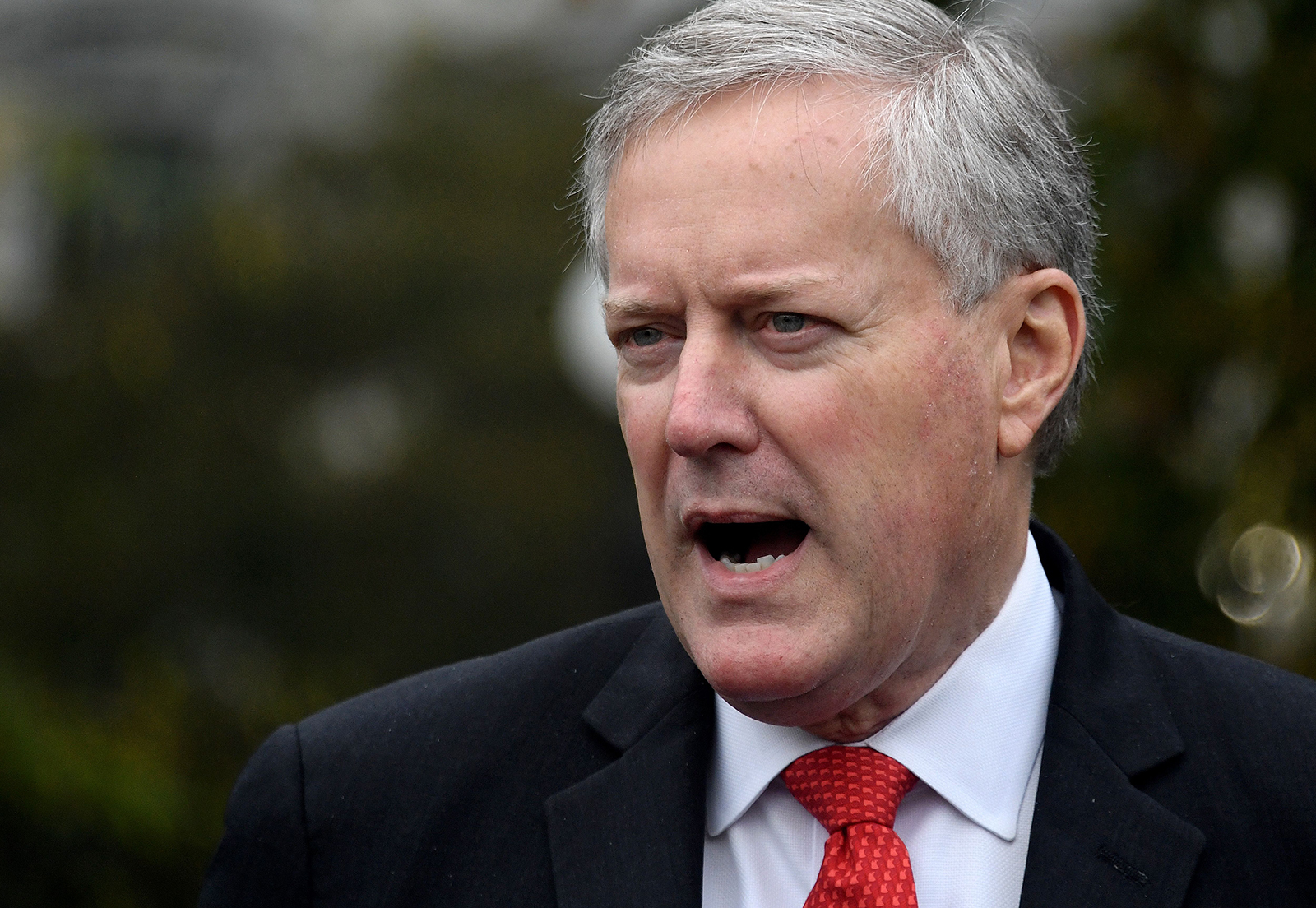
Members of the House select committee investigating the January 6 attack on the US Capitol have shown they’re willing to pursue criminal contempt referrals against witnesses who refuse to comply with the panel’s subpoenas.
Former President Trump’s former chief of staff Mark Meadows is the latest official to face such a referral from the panel. Committee Chairman Bennie Thompson, a Democrat from Mississippi, said that Meadows left the committee with “no choice but to advance contempt proceedings” after he stopped cooperating with the panel.
Members voted Monday night to formally advance the criminal contempt report against Meadows for a full floor House vote, which is expected to come Tuesday. The vote by the full House is the last step before sending the referral to the Justice Department.
But what does that mean? Criminal contempt is one of the three options the congressional panel can pursue to enforce its subpoenas, along with civil and inherent contempt.
Once a criminal contempt referral clears the House select committee, it heads to the full House for a vote. If that vote succeeds, House Speaker Nancy Pelosi certifies the report to the United States attorney for the District of Columbia.
Under law, this certification then requires the United States attorney to “bring the matter before the grand jury for its action,” but the Justice Department will also makes its own determinations for prosecuting.
Any individual who is found liable for contempt of Congress is then guilty of a crime that may result in a fine and between one and 12 months imprisonment. But this process is rarely invoked and rarely leads to jail time.
As severe as a criminal contempt referral sounds, the House’s choice to use the Justice Department may be more of a warning shot than a solution. Holding a person in criminal contempt through a prosecution could take years, and historic criminal contempt cases have been derailed by appeals and acquittals.
The committee approved a criminal contempt report against Trump ally Steve Bannon in October after he refused to comply with a subpoena deadline.
Read more about criminal contempt and how it compares with civil and inherent contempt.
CNN’s Zachary Cohen, Ryan Nobles, Annie Grayer, Whitney Wild and Kristen Holmes contributed to this report.
Jan. 6 committee votes to recommend contempt charges for Mark Meadows
From CNN’s Zachary Cohen, Ryan Nobles and Kristin Wilson
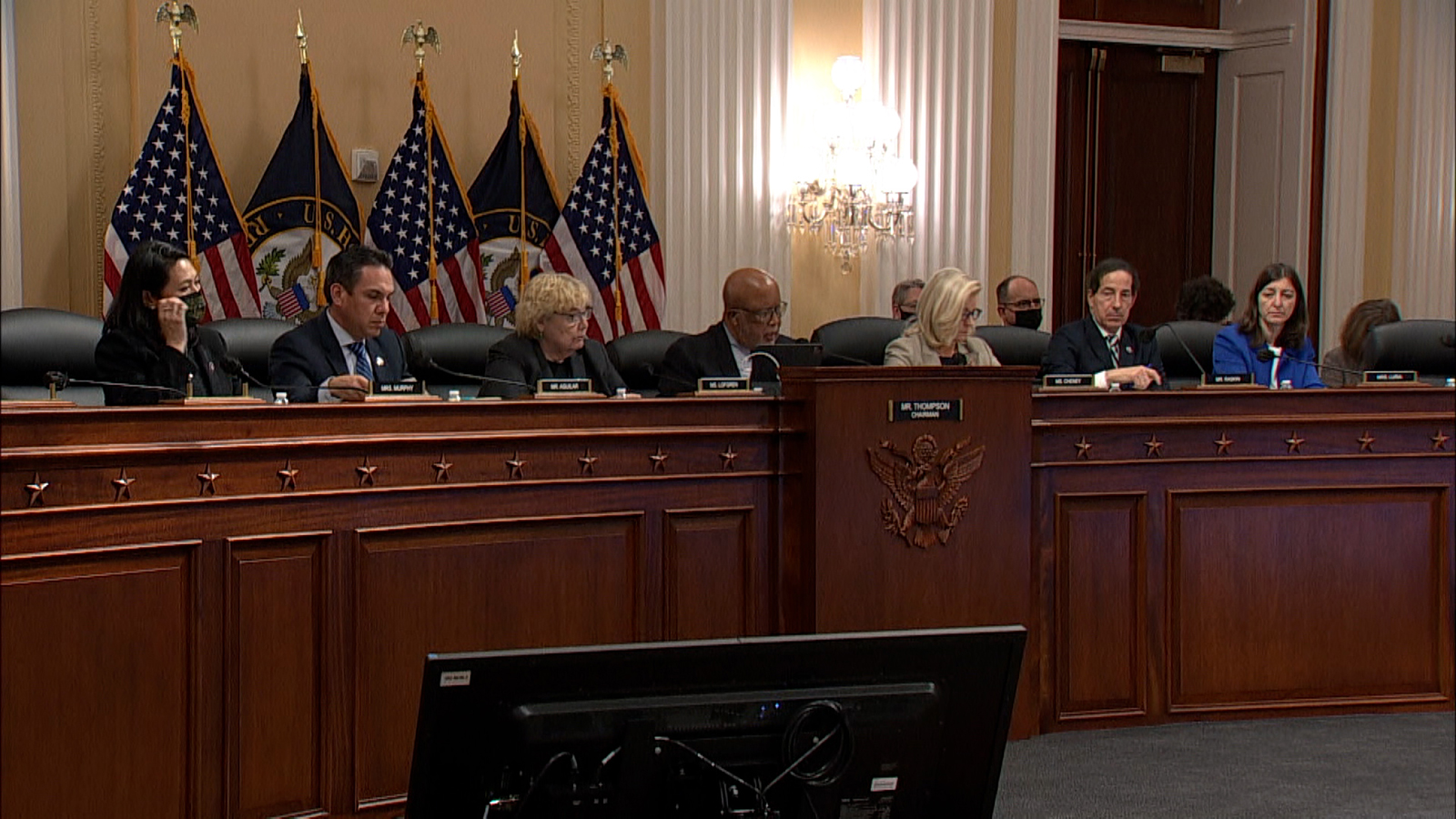
The House select committee investigating the Jan. 6 riot at the US Capitol voted Monday to recommend that former White House chief of staff Mark Meadows be referred to the Department of Justice on criminal contempt of Congress charges for his refusal to cooperate with the committee or appear for a scheduled deposition.
Rep. Liz Cheney, a Republican from Wyoming, made the motion for the committee to vote for the contempt resolution.
The vote in the committee, made up of nine lawmakers, was unanimous. The contempt resolution is expected to come to the House floor for a vote on Tuesday.
“Mr. Meadows started by doing the right thing — cooperating. He handed over records that he didn’t try to shield behind some excuse,” Rep. Bennie Thompson, the committee’s chair, said. “But in an investigation like ours, that’s just a first step. When the records raise questions — as these most certainly do — you have to come in and answer those questions. And when it was time for him to follow the law, come in, and testify on those questions, he changed his mind and told us to pound sand. He didn’t even show up.”
The committee showed texts sent between Meadows and lawmakers, Fox News personalities and then-President Trump’s own son about the urgency for the former president to act to stop the siege.
Jan. 6 committee releases texts of Meadows’ conversations with lawmakers, Trump’s son and Fox News hosts
From CNN’s Ryan Nobles, Zachary Cohen and Kristin Wilson
The House select committee investigating the Jan. 6 Capitol insurrection has released more information about texts sent to former White House chief of staff Mark Meadows during the days around the insurrection.
Texts from unnamed lawmakers sent to Meadows said that former Vice President Mike Pence “should call out all electoral votes that he believes are unconstitutional as no electoral votes at all.”
Rep. Liz Cheney, a Wyoming Republican and the committee’s vice chairwoman, said other texts were sent in real time about the events as they unfolded.
“These text messages leave no doubt. The White House knew exactly what was happening here at the Capitol,” Cheney said. “One text Mr. Meadows received said quote, ‘We are under siege here at the Capitol.’”
“In a third, ‘Mark, protesters are literally storming the Capitol, breaking windows on doors, rushing in. Is Trump going to say something?’ A fourth, ‘There’s an armed standoff at the House chamber door.’ And another from someone inside the Capitol: ‘We are all helpless.”
Cheney also read texts from news personalities from Fox News and Trump’s own son.
“Donald Trump Jr. texted again and again, urging action by the President. Quote, ‘We need an Oval Office address. He has to lead now. It has gone too far. And gotten out of hand’ end quote, but hours passed without necessary action by the President,” Cheney said.
When the events of the certification of the Electoral College eventually happened in the early hours of Jan. 7, Meadows received a text calling Jan,. 6 a “terrible day.”
“Yesterday was a terrible day. We tried everything we could in our objections to the 6 states,” the text read. “I’m sorry nothing worked.”
These are the text images shown in graphics during the committee meeting:
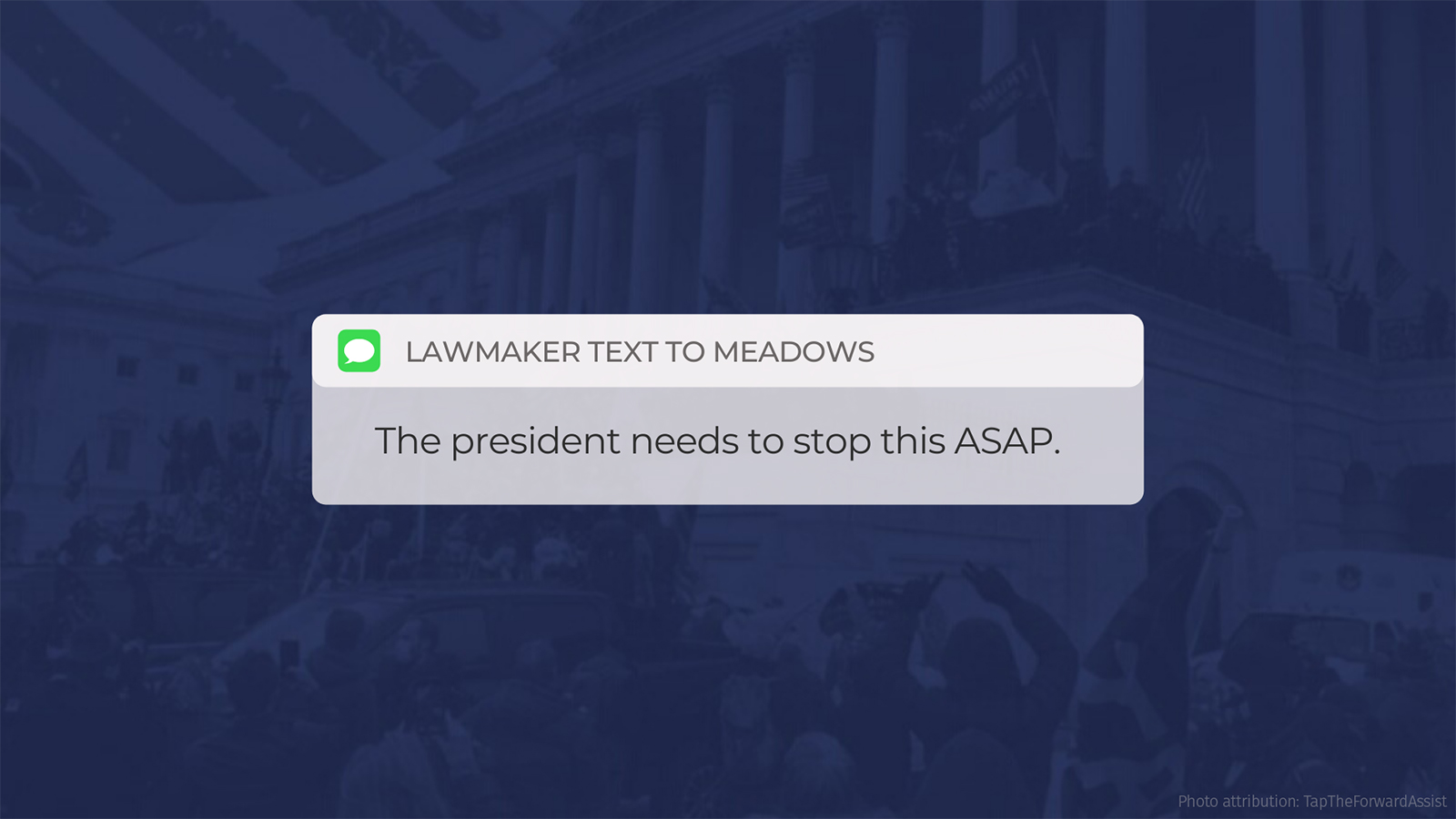
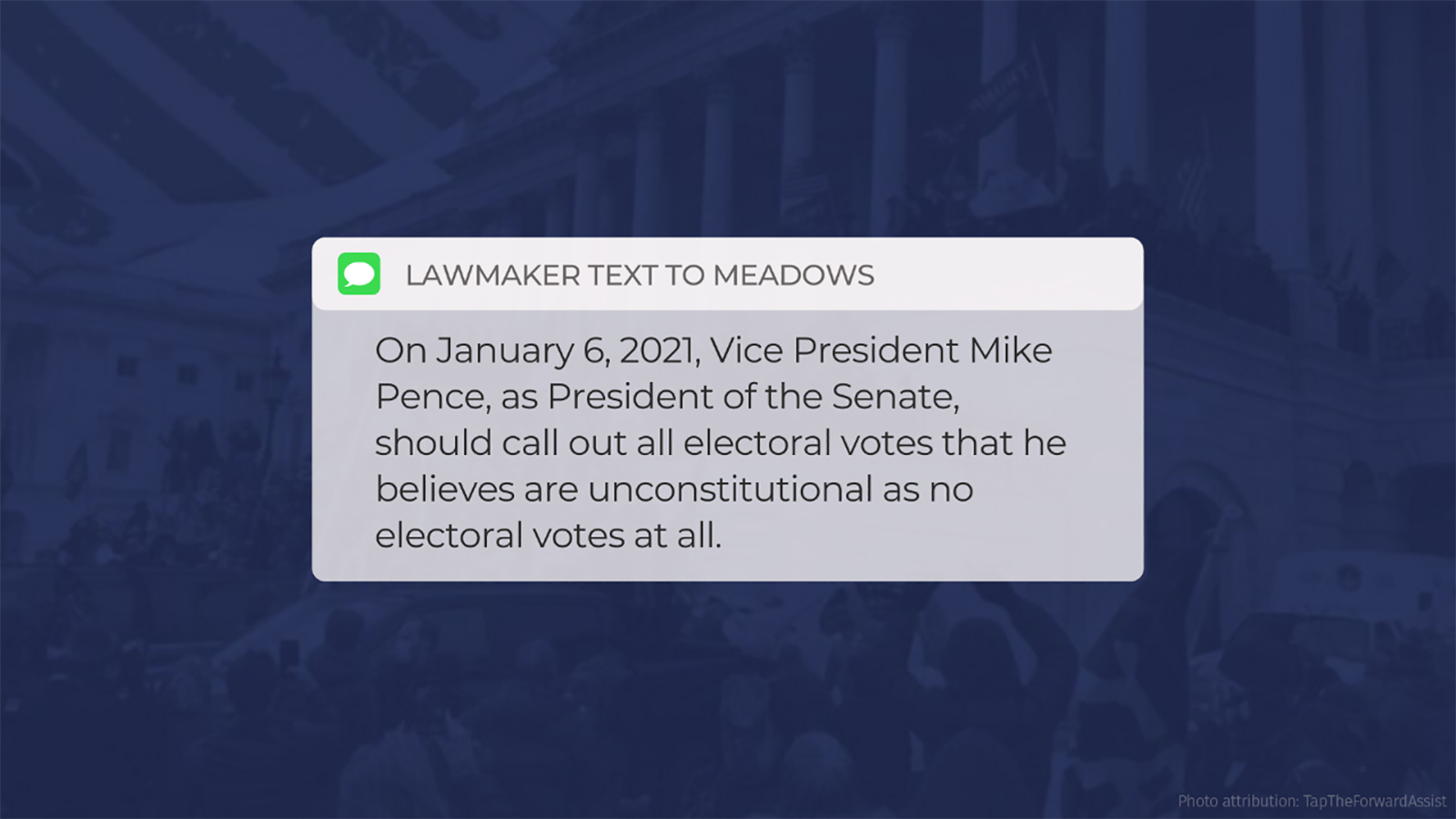
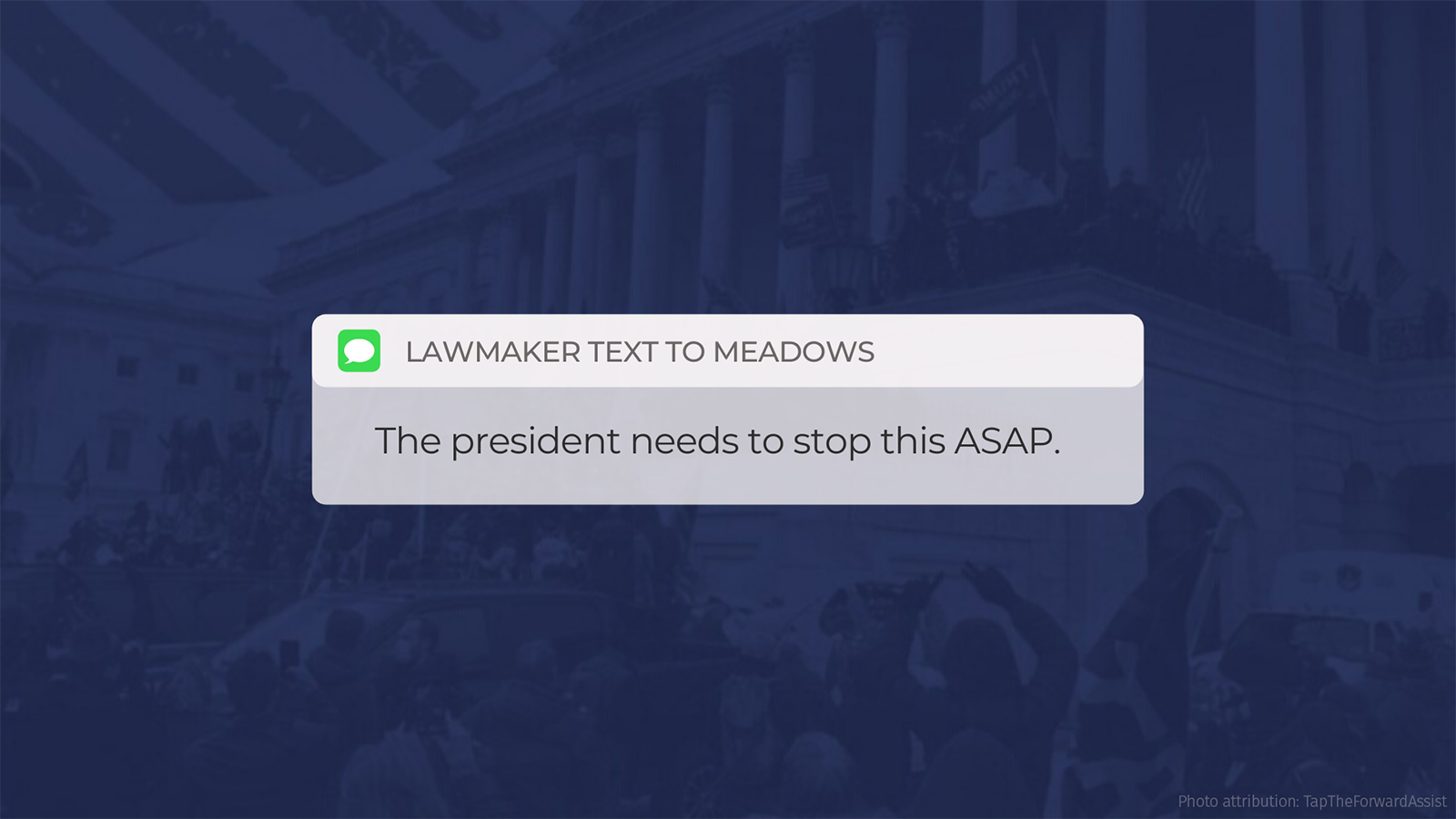
Jan. 6 committee begins meeting to consider holding ex-White House chief of staff Meadows in contempt
From CNN’s Ryan Nobles
The House select committee investigating the Jan. 6 riot is meeting now to consider a resolution to hold Mark Meadows, former chief of staff in the Trump White House, in contempt of Congress.
“The select committee’s report referring Mr. Meadows for criminal contempt charges is clear and compelling,” Committee Chair Bennie Thompson, a Democrat from Mississippi, said during his remarks. “As White House chief of staff, Mr. Meadows played a role in or was witness to key events leading up to and including the January 6th assault on the United States Capitol.”
Thompson continued: “It comes down to this, Mr. Meadows started by doing the right thing, cooperating. He handed over records that he didn’t try to shield behind some excuse. But in an investigation like ours, that’s just the first step. When the records raise questions as these most certainly do, you have to come in and answer the questions. And when it is time for him to follow the law, come in and testify on those questions. He changed his mind. And he told us to pound sand. He didn’t even show up. “
Meadows is the latest official to face the possibility of such a referral from the panel. The committee approved a criminal contempt report against Trump ally Steve Bannon in October after he refused to comply with a subpoena deadline.
The committee was ready to move forward with holding former Department of Justice official Jeffrey Clark in contempt but is giving him another chance to testify as he says he plans to plead the Fifth.
Jan. 6 committee chair will recognize any member who wishes to speak at meeting
From CNN’s Ryan Nobles
A House select committee aide tells CNN that Rep. Bennie Thompson, who chairs the panel, will recognize any member of the committee who wishes to speak on the resolution that will refer former White House Chief of Staff Mark Meadows for criminal contempt.
In the past, only Thompson and Liz Cheney, vice chair of the panel, have spoken during business meetings of the committee that’s investigating Jan. 6.
Tonight, we expect to hear from several, if not all, of the members.
Mark Meadows is suing the House Jan. 6 committee to block subpoenas
From CNN’s Tierney Sneed and Ryan Nobles
Former Trump White House chief of staff Mark Meadows is suing the House select committee investigating Jan. 6 and House Speaker Nancy Pelosi, asking a federal court to block enforcement of the subpoena the committee issued him as well as the subpoena it issued to Verizon for his phone records, according to the complaint filed Dec. 8.
The lawsuit came after the committee signaled it would pursue a criminal contempt referral against Meadows because of his refusal to sit for a deposition in the investigation into the Capitol riot. Meadows alleges that the subpoenas are “overly broad and unduly burdensome,” while claiming that the committee “lacks lawful authority to seek and to obtain” the information requested.
Republican Rep. Liz Cheney of Wyoming, who serves as vice chair of the panel, told CNN last Wednesday evening, “We look forward to litigating that.” Cheney noted that Meadows is refusing to answer questions about documents that he turned over voluntarily.
“The committee has received a number of extremely interesting, non-privileged documents from Mr. Meadows. These include text messages and emails from his private cell phone and private email account. He’s produced these documents, they are not privileged,” she said. “They include documents that are directly related to what President Trump should have been doing on January 6 during the attack, and now he is refusing to appear to answer questions about those non-privileged documents.”
The lawsuit points to President Biden’s refusal to assert executive privilege, which former President Trump has sought, in the investigation — a dispute currently being litigated in a separate case Trump has brought seeking to block the release of his White House records to House investigators.
“As a result, Mr. Meadows, a witness, has been put in the untenable position of choosing between conflicting privilege claims that are of constitutional origin and dimension and having to either risk enforcement of the subpoena issued to him, not merely by the House of Representatives, but through actions by the Executive and Judicial Branches, or, alternatively, unilaterally abandoning the former president’s claims of privileges and immunities,” Meadows’ lawsuit said.
Read more here.
Why the Jan. 6 committee says it is moving forward with criminal contempt for Meadows
From CNN’s Zachary Cohen and Ryan Nobles

The Jan. 6 committee informed former White House chief of staff Mark Meadows last week that it had “no choice” but to advance criminal contempt proceedings against him given that he had decided to no longer cooperate with its investigation.
On Sunday, the committee released its contempt report, which contained several new details about Meadows’ actions before and during Jan. 6, as well as his role in attempting to overturn the 2020 election.
The committee notes that in one email Meadows sent to an individual about Jan. 6, he said that “the National Guard would be present to ‘protect pro Trump people’ and that many more would be available on standby.”
Additionally, the committee said in the report that Meadows “exchanged text messages with, and provided guidance to, an organizer of the January 6th rally on the Ellipse after the organizer told him that ‘[t]hings have gotten crazy and I desperately need some direction.'”
The new documents come as Meadows’ role is under renewed scrutiny following his decision to cease cooperating with the committee last week.
The committee has previously sought communications between Meadows and certain rally organizers as the panel remains focused on identifying any level of coordination with the Trump White House. The report goes on to note that Meadows was directly involved in efforts to overturn the election results in key swing states Trump lost and helped push unfounded claims about voter fraud.
Meadows’ lawyer asked the panel Monday to reconsider its plans. In a letter to the committee, Meadows’ attorney George Terwilliger III said the “contemplated referral would be contrary to law” because his client is a senior official who made a “good-faith invocation of executive privilege and testimonial immunity.”
What the committee is expected to do tonight: Members of the panel will vote to formally advance the criminal contempt report against Meadows for a full floor House vote as soon as later this week.
The vote by the full House is the last step before sending the referral to the Justice department.
Former DC National Guard commander is meeting with Jan. 6 committee, source says
From CNN’s Ryan Nobles, Holmes Lybrand and Zachary Cohen
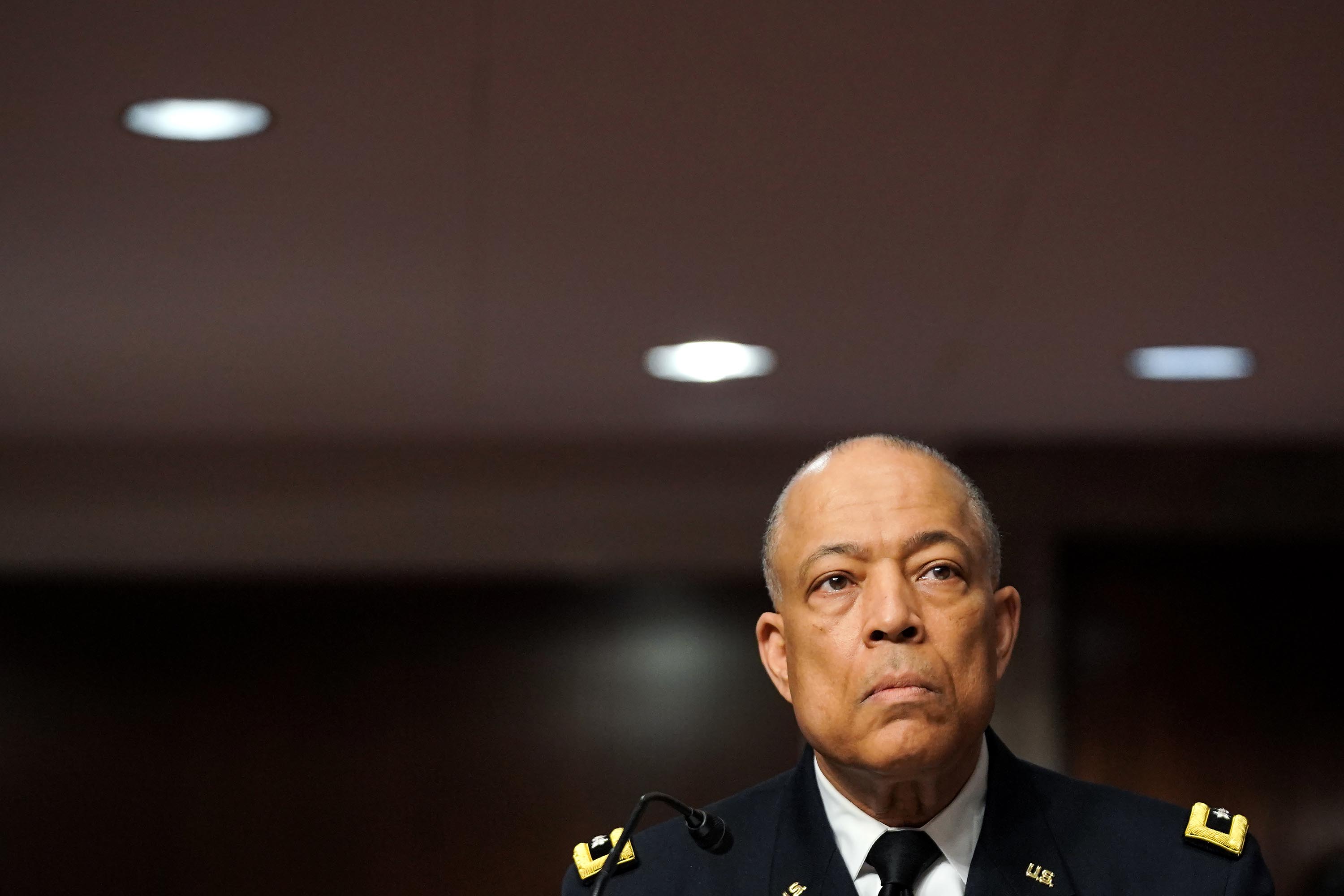
William Walker, who was the top commander for the National Guard in Washington, DC, and responsible for troop deployment in support of law enforcement overwhelmed on Jan. 6, is meeting today with the House select committee, a source familiar with his appearance confirms to CNN.
CNN spotted Walker walking into the meeting with committee staff this afternoon. His meeting is currently ongoing.
Walker was appointed the House Sergeant at Arms in April. On Jan. 6, he was commanding general of the District of Columbia Army and Air Force National Guard.
Walker made waves in March during his testimony to a Senate panel investigating the US Capitol insurrection. Walker told the Senators that even though did not need Pentagon authority to mobilize troops to respond to protests that summer, a memo on Jan. 5 instructed him to seek approval from the Secretary of the Army and Defense before preparing troops to respond to a civil disturbance.
Walker described the additional level of authority needed to mobilize troops as “unusual.” He went on to say it took three hours for Army officials to give him the okay to send his troops in to help — this despite an urgent plea directly to him from the then Capitol Police Chief Steven Sund.
Newly revealed emails from former White House chief of staff Mark Meadows have raised additional questions about the National Guard response on Jan. 6.
Meadows sent an email saying the National Guard would be present to “protect pro Trump people” in the lead-up to the insurrection, according to a new report released by the House Select Committee Sunday night.
Walker has not responded to a CNN request for comment on his meeting with the committee.
The select committee would not comment on Walker’s appearance.
How Trump tried to weaponize the Justice Department to overturn the 2020 election ahead of Jan. 6 riot
From CNN’s Marshall Cohen
A full year after the 2020 presidential election, new details are still emerging about former President Trump’s unprecedented effort to overturn the results.
Many of Trump’s actions were done in public view, including dozens of ill-fated lawsuits and tweets that undermined the electoral process. But congressional inquiries and news reports have shed new light on what happened behind the scenes as Trump tried to cling to power.
Perhaps the most disturbing aspect of Trump’s attempted coup was how he relentlessly tried to weaponize the Justice Department to nullify President Joe Biden’s victory. The Democratic-run Senate Judiciary Committee investigated Trump’s conduct and concluded in a recent report that he “grossly abused the power of the presidency.”
Here’s a big-picture breakdown of the attempted coup, along with a day-by-day timeline of Trump’s efforts to co-opt the Justice Department to help his campaign.
Big-picture summary of the coup attempt: Four days after Election Day, CNN and other news outlets projected that Biden had won. Instead of conceding, Trump immediately started pressuring local, state and federal officials to overturn the results. Many of these officials rebuffed his demands, concluding they were unethical, illegal or unconstitutional. But some officials and advisers joined the charge and tried to help.
Within weeks, Trump met with and spoke to officials from Michigan and Pennsylvania who were involved in the election process, hoping they’d block Biden’s victory. He fired a senior cybersecurity official at the Department of Homeland Security who publicly debunked his lies about voter fraud. And he cranked up the pressure on the Justice Department, even after Attorney General Bill Barr ordered prosecutors to investigate voter fraud allegations.
He tried — but failed — to stop certification in key states in late November and December. After that, Trump and his allies filed meritless lawsuits across the country seeking to nullify the results.
Trump called Pennsylvania lawmakers, urging them to ignore the fact that Biden won their state and appoint GOP electors instead. He called Georgia’s governor and pushed him to convince state lawmakers there to do the same. These efforts also fell flat, and members of the Electoral College met on Dec. 14, 2020, to officially affirm Biden’s victory.
Running out of time before the transfer of power, Trump became increasingly desperate and even entertained a suggestion to declare martial law. In a now-infamous call on January 2, 2021, Trump pleaded with Georgia’s top election official to “find” enough Republican votes to overtake Biden’s margin. (This phone call is now at the center of a criminal investigation by state prosecutors in Atlanta.)
Trump and his allies repeatedly urged top Justice Department officials to help them overturn the results — and Trump nearly fired the acting attorney general who refused to do his bidding.
Trump also mounted a private and public effort to pressure Vice President Mike Pence into unconstitutionally nullifying Biden’s win while presiding over the Electoral College process.
The coup attempt reached a horrifying crescendo on Jan. 6, 2021, when Trump held a massive rally near the White House and incited thousands of supporters to attack the Capitol while lawmakers were certifying the Electoral College results. The insurrection was quelled, but it led to five deaths and 140 police officers were injured. Biden was inaugurated two weeks later.
See a detailed timeline of Trump’s efforts to abuse the Justice Department here.
Source: https://www.cnn.com/politics/live-news/mark-meadows-house-committee-hearing/index.html
















